

China is riding a sound economic momentum but still needs to iron out certain issues such as energy upgrading and tougher financial reforms to stay competitive in the next decade, according to an American economist.
In his book China's Century, published in 2001, Laurence Brahm, based on his 20-year research in the country, made a prophecy that China was going to be the next economic powerhouse in the new age, a sentiment dismissed by his US mainstream peers at that time.
 |
|
Laurence Brahm, an American born political-economist, lawyer and writer, talks at "Cover to Cover", a cultural salon by NEWS Plus Radio with China Radio International and Page One bookstore in Beijing on September 27th, 2013. [Photo/chinadaily.com.cn] |
Twelve years on, however, the assumption has been consolidated if not proved as the Chinese dragon has stormed past Germany and Japan to become the world's second-largest economy.
"China's economy kind of started from a relatively low platform, which, on the other hand, means it had much bigger room for improvement and possibly a faster growth rate," he said
Brahm made the remarks at Cover-to-Cover, a reading salon co-hosted by NEWS Plus Radio with China Radio International and Page One Bookstore in Beijing on Friday.
Being able to witness China realizing its economic potential and be part of it made Brahm, who came to Tianjin to study in 1981, determined to stay.
With keen observations, solid expertise in his major and fluent Mandarin, Brahm's career took off as quickly as China's economy throughout the '80s and '90s. He has a growing career list of lawyer, businessman, multinational enterprise consultant, author and economic advisor of the Chinese government, which, if deemed a success, should be attributed to policy-makers' decisions on economic reform.
"The major change occurred in 1992, when the idea of a marketing economy came in and suddenly there were major changes in the economy. And again in 1998, when there was a decision by (then) Premier Zhu Rongji to take apart traditional State-owned enterprises and turn them into commercial businesses."
In the latest observation by the straight-talking guest, China can still roll, but it has got some serious concerns that need to be tackled.
"I think China is currently at a crossroad because in the past 10 years China's development was mainly stimulated by investment in infrastructures. But the truth is that China's economy is filled with unstable factors, like the deteriorating environment and the destruction of land and water."
He went on to elaborate on the importance of an economic rebalance, such as cutting coal consumption and adopting cleaner energy in production.
"Energy conservation should be promoted across all the enterprises. If China follows this pattern, it will be endowed with the so-called ‘soft power' and set a great example for many other countries," he said.
His view echoes a national plan issued by the State Council in early September to fight air pollution through a variety of tough methods.
"We're entering a new era. I would like to characterize it as a rebalancing era, a rationalization of some systems that have been distorted. And (what is important is) how China can create a new growth trend based on the development of renewable energy and energy efficiency. I think this is the most critical challenge," said Brahm, who spent the last 10 years in Tibet working on the preservation of ethnic diversity through sustainable economics.













